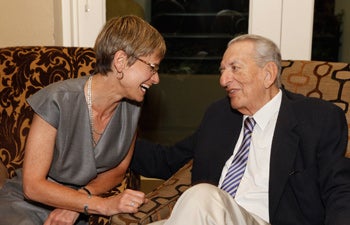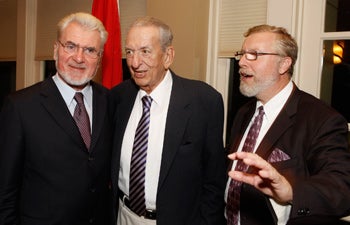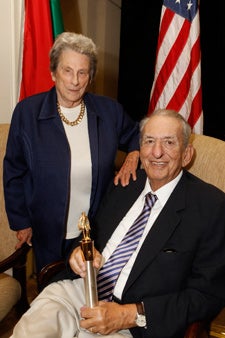Hungary Honors Native Son George Olah
George Olah was born May 22, 1927, in his parents’ apartment in the Pest part of Budapest, Hungary, off the iconic Andrássy Avenue and across from the magnificent state opera house.
Many opera company conductors, musicians and singers lived in the ornate apartment building, designed by Miklós Ybl who created the richly decorated opera house. As a child, Olah often attended operas and rehearsals with neighbors.
“I myself, however, had no musical inclination or talent,” Olah wrote in his memoir, A Life of Magic Chemistry (Wiley-Interscience, 2001). That has been a blessing for the world, since Olah turned his attention to chemistry and revolutionized the understanding of organic chemistry, leading to new discoveries, new fields of research and countless applications.
USC Dornsife’s Distinguished Professor of Chemistry and Chemical Engineering and Materials Science, and Donald P. and Katherine B. Loker Chair in Organic Chemistry, Olah won the 1994 Nobel Prize for Chemistry for his crucial work on reactive intermediates in hydrocarbons.
On Thursday night, his native country of Hungary honored its hero with the Széchenyi-nagydíj Grand Prize during a ceremony at the Bel Air Crest Clubhouse. Professor József Pálinkás, president of the Hungarian Academy of Science, traveled from Hungary to present the award to Olah, recognized for his outstanding contributions to academia worldwide.

USC Provost Elizabeth Garrett congratulates chemist George Olah during the Széchenyi-nagydíj Grand Prize ceremony.
The award was presented on behalf of the prime minister of Hungary, Viktor Orbán. Ambassador Balázs Bokor, consul general of Hungary in Los Angeles, who hosted the ceremony, introduced Pálinkás.
“In Hungary if you mention George Olah’s name, everyone, not only chemists and scientists will know who he is,” Pálinkás said. “This is so symbolic that I came here to Los Angeles to give this prize for his scientific achievement, but also for his achievement which belongs to humanity, to human behavior and the attitude that George Olah always has toward science, toward mankind and toward Hungary. Professor Olah is currently and actively working on his research that I’m sure will change the energy supply of mankind. You may think that’s a very big statement but I think history will prove it.”
Surrounded by his colleagues and family, including his wife of 62 years, Judy, Olah said he would “do my best for my native country.”
“I left Hungary a long while ago and have lived for 50 years in the states,” Olah told attendees, including USC Provost Elizabeth Garrett. “I consider myself after all this time an American of Hungarian origin and I’m very proud of my Hungarian heritage. Scientists are educators and over the years I’ve had more than 250 doctoral and postdoctoral students whom I consider my extended family. They come from all corners of the world. I must tell you those who come from Hungary have a special place in my heart.
“It’s a great pleasure to be able to do something in our very limited way to further the development of science and higher education,” said Olah who founded USC’s Loker Hydrocarbon Research Institute in 1977. “But you know you don’t build a tall building starting on the 50th floor. You need to have a solid foundation.”

Nobel laureate George Olah (center) chats with József Pálinkás, president of the Hungarian Academy of Science (left), and Balázs Bokor, consul general of Hungary in Los Angeles, who hosted the ceremony in Bel Air.
The prize included a bronze statue depicting Count István Széchenyi, (1791–1860), a Hungarian politician, theorist and writer, and one of the greatest statesmen in the country’s history.
President C. L. Max Nikias said Olah brings tremendous honor to USC through his many achievements.
“This most recent distinction speaks to the prescience and relevance of his pioneering research, and the entire Trojan Family warmly cheers him,” Nikias said. “His work will benefit society for generations to come.”
Garrett, also senior vice president of academic affairs at USC, said Olah has transformed the scientific landscape of the past century through his research breakthroughs in organic chemistry and the chemistry of carbocations.
“His recent work on the methanol economy has the potential to revolutionize the way we live,” Garrett said. “Through commercialization of his work at the Loker Hydrocarbon Research Institute, our country could reduce our dependence on fossil fuels and harness carbon dioxide as a powerful driver of economic growth and sustainable energy policy. Our academic community is immeasurably enhanced by Dr. Olah, and he richly deserves this international recognition.”
USC Dornsife Dean Howard Gillman echoed those remarks.
“Professor Olah is one of the most important and accomplished scientists of our generation,” Gillman said. “His groundbreaking work has opened new frontiers of knowledge, and by virtue of his discoveries we have new paths for improving our world.
“We are incredibly honored to call George Olah colleague and friend, and all of us at the USC Dornsife College of Letters, Arts and Sciences congratulate him on this great honor.”

George Olah met Judy Lengyel in 1943 during a summer vacation at a resort near Budapest. He was 16, she was 14. They celebrated their golden wedding anniversary in 1999.
Olah’s research focuses on hydrocarbons, derived from petroleum, natural gas or coal essential to modern life. The bulk of the world’s hydrocarbons is used for fuels, electrical power generation and heating, as well as for manufacturing plastics and rubber. The world’s overall oil use exceeds 10 million metric tons a day. Olah is working toward finding unlimited cheap energy storage materials with the promise of safer atomic energy and other alternate energy sources. Olah and his colleagues in the Loker Hydrocarbon Research Institute housed in USC Dornsife have found that hydrogen produced by splitting water can then be combined with carbon dioxide to produce methanol and related hydrocarbon derivatives. In the meantime, they are searching for technological solutions that are feasible in the foreseeable future.
His fascination with science began in Hungary, when Olah’s friend received a chemistry set for Christmas and invited his pal to start a few experiments in the basement of his home.
“This was probably when I first experienced the excitement of some of the magic of chemistry,” Olah wrote in his memoir. “After going through some of the routine experiments, we boldly advanced to more interesting ‘individual’ experiments, resulting in an explosion followed by a minor fire and much smoke.”
His boyhood was also fraught with horrifying times during World War II, when he and his family hid out during the last months of the war. His only brother Peter, three years his senior, perished at the end of the war in a Russian prisoner of war camp, where he was taken with tens of thousands of civilians to satisfy claimed numbers of prisoners of war. During the 1956 Hungarian Revolution, Olah and his family fled to England, then moved to Canada, then to the United States.
He initially studied chemistry because he thought the field would allow him to make a good living.
“Look, I fell in love with chemistry, don’t ask me why, and I’m still in love with it,” Olah said in an interview. “You don’t do this work to get prizes or recognition. In my humble opinion, you do it because you believe in it.”